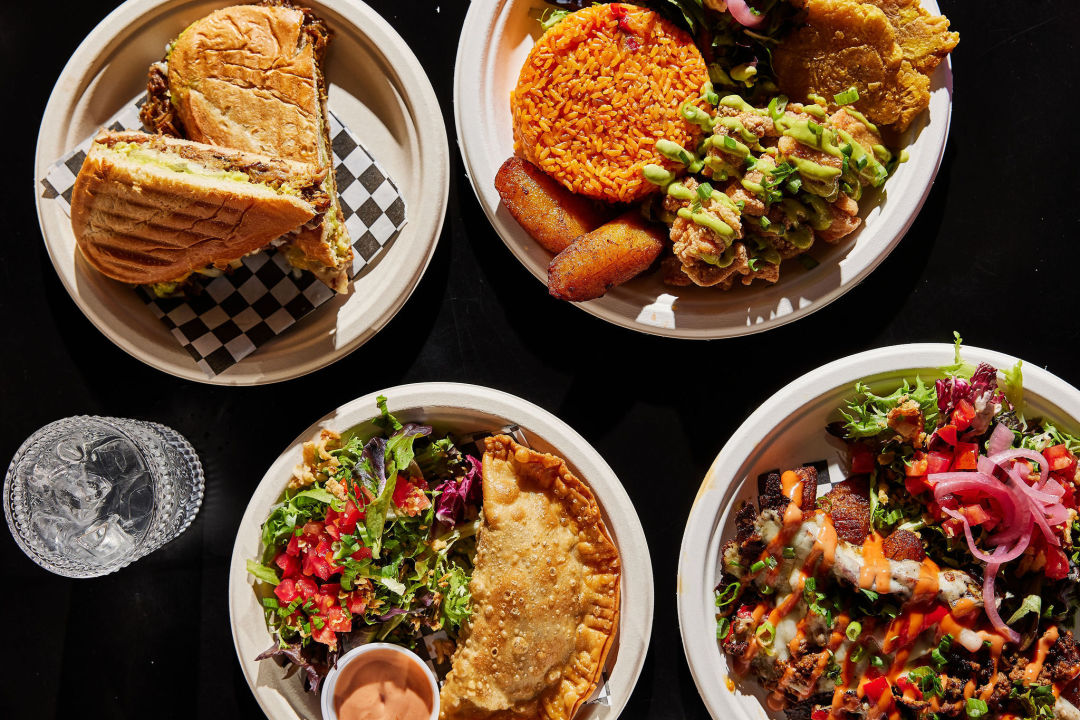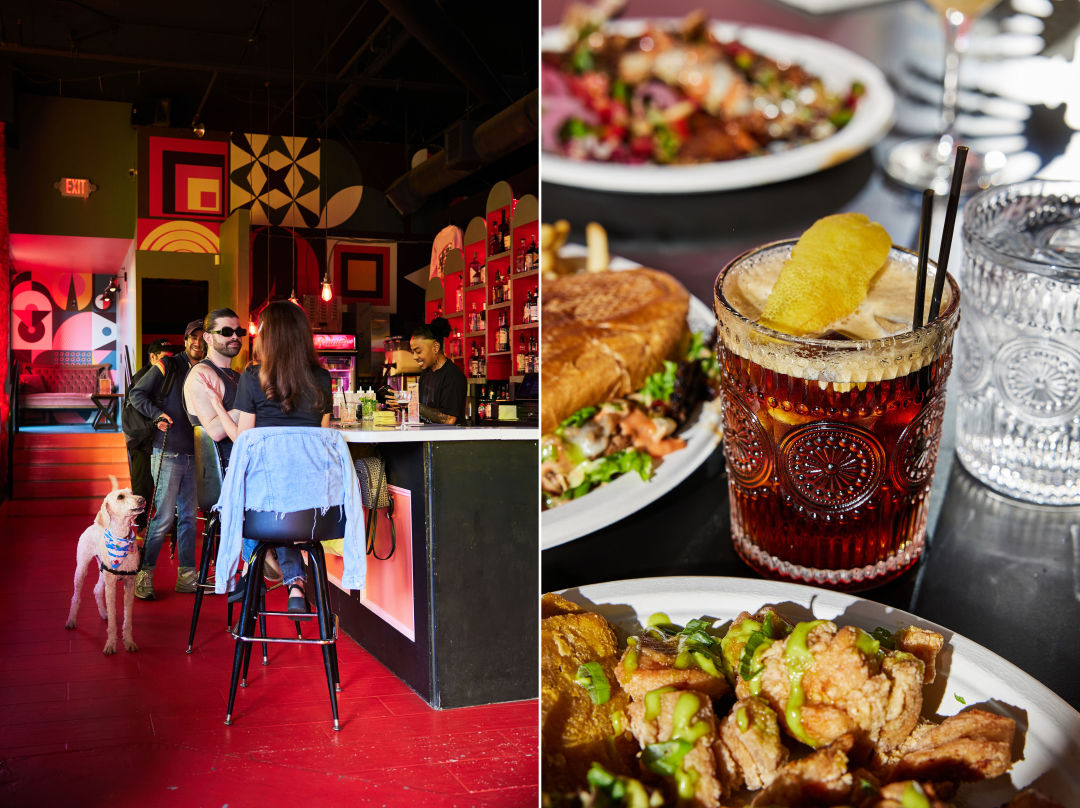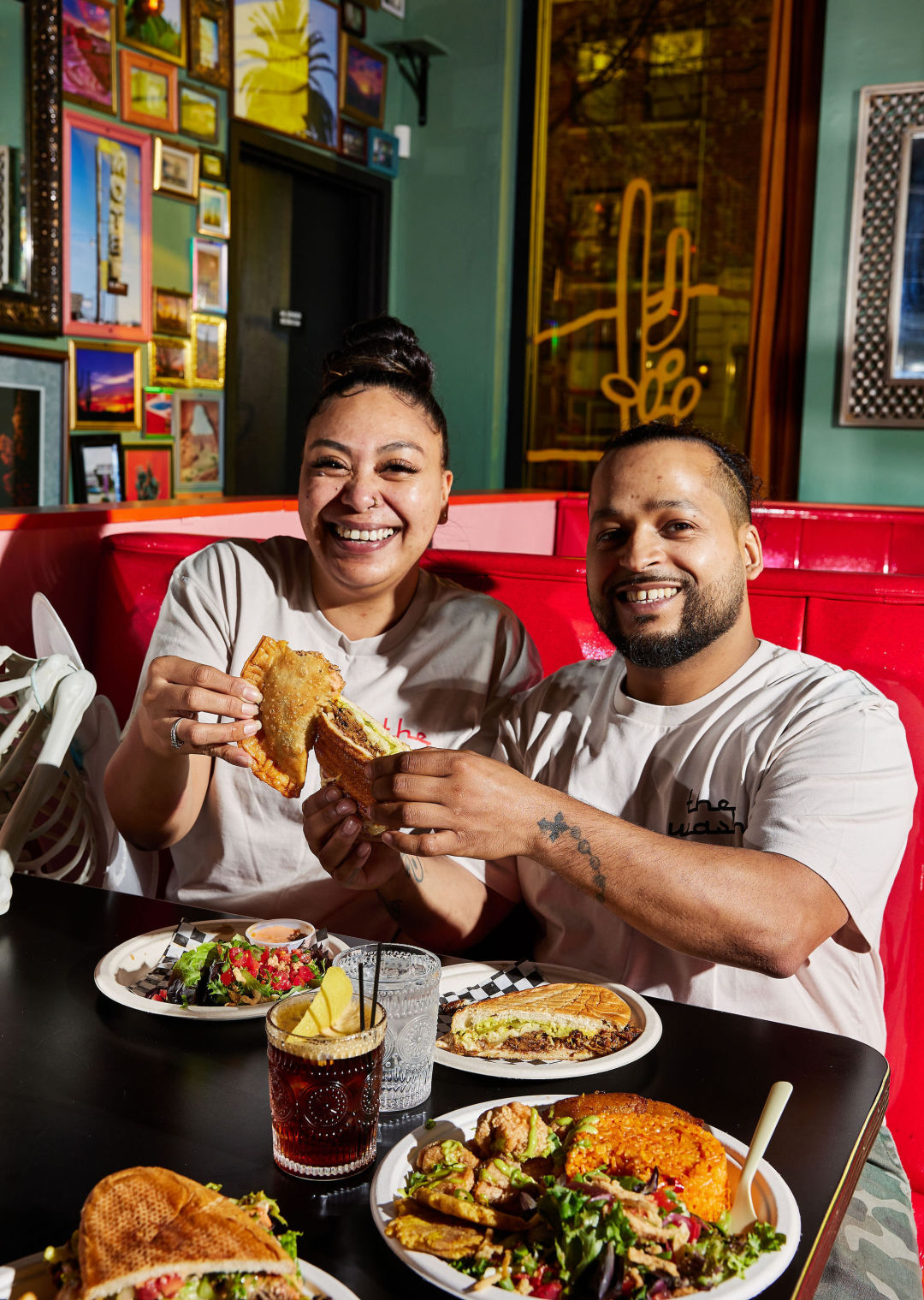Capitol Hill’s Chamorikén Feeds a Party Where Everyone’s Invited

Image: Amber Fouts
At 10 pm on a Friday night, most of the people at Capitol Hill’s the Wash seem high enough for the entire bar to take flight, floating into the night sky on the good ship Lolli-pot. I feel every year of my age when I begin raving about the salad that came on the side of my fried shrimp plate. The pickled onions taste like candy, not in a cloying, sugary way, but as a fantastical amplification of the onion’s own distinct sweetness; the scallions and cilantro tuck into the tangle of chopped lettuce. A guy I chat with at the bar chuckles at my vegetal awe and rejects my recommendation in favor of the loaded fries, piled with bacon and cheese.
That type of stoner food might seem like the right answer at this type of place, with its furry walls, big vinyl booths, and neon lighting that blurs everything. It’s not. You can get loaded fries elsewhere. Here, order the empanada, the chopped cheese sandwich, or any of the plates—all of which come with that salad and its intoxicating garlic mojo aioli dressing.
At the Puerto Rican restaurants that chef Jesus Dumois grew up going to, salad came on every plate. “That’s hospitality,” Dumois explains. “Anywhere on the island, I promise you that you’re going to get what you asked for and a little bit more.” The comment, like Dumois himself, and his menu, is surprisingly thoughtful, given that his restaurant, Chamorikén, is located inside an establishment where some of the walls belong in a Route 66 motel, others look like what happens when Kirby crashes into a Muppet, and much of the clientele are blazed enough that hearing description makes them pause and say, “Whoa.”

Image: Amber Fouts
Chamorikén itself is Puerto Rican, and a little bit more. The name is a portmanteau of Dumois’s heritage with that of his partner in life and business, Heather Dowai, who is Chamorro—Indigenous Pacific Islander. There are Dominican, Floridian, Guamanian, Nuyorican, Louisianan, and Filipino dishes on the menu. In 2023, while Dumois worked as a personal chef, and Dowai as a medical assistant, they started a small barbecue pop-up on weekends—a hobby they hoped could bring in a little extra cash for their growing family. The combined concept was inspired by the similarities between how the two island cultures eat: Sitting down to the vibrant Chamorro meals with Dowai’s family, Dumois felt at home. “I really didn’t see a difference in what they were putting on the table, other than a few different ingredients,” he says. “It looked very similar to how we would display our food in our culture.”

Image: Amber Fouts
After two summers of increasing popularity, they added in a residency at the Wash, selling their food two days a week for a few months, then moving in permanently, seven days a week, in late January. The move inside, where they can’t grill over open flame, required changing the menu a bit—most of the Chamorro dishes, like barbecued chicken and coconut bread, got put on hold.
Chamorikén did with its menu what islanders have always done with their cuisines: adapt—adding new flavors, incorporating new ideas. “I want to cook what I’m used to eating, what my grandma will make, what her parents would make,” says Dumois. “It’s not always easy to craft that, so we just get creative with it and use our form of expression.”
The dishes that didn’t come from his own grandmother came from elsewhere in Dumois’s life: his mother-in-law (notably, the lumpia), and his favorite bodegas. “The chopped cheese is my childhood,” he says. His family moved from Puerto Rico to the Bronx when he was 4, and he went from pulling the fresh fruit from trees on the street to running to the corner store for his mom and picking up groceries and the dirt-cheap New York staple sandwich. “The culture didn’t die, it just kind of like became a New York–Rican kind of thing.”

Image: Amber Fouts
In a detail whose cross-culturalism seems too perfect, Dumois sourced the ideal bread for Chamorikén’s version of the nostalgic sandwich from a Mexican market, where the style is called pan Francés—French bread. Soft and moist, the bottom bun cradles the heap of peppers and ground beef, spiced up with the annatto-based house spice mix. The cheese from which it takes its name melts in and around the meat, tenaciously attempting to hold together the loose mess as it leaps for freedom with the energy of preschoolers let loose in a trampoline park. The top bun sits off to the side, displaying its generous squiggle of paprika-tinged mayo-ketchup. Within seconds of getting my meal, I flagged the bartender for some silverware—which I assume is some sort of New Yorker sin.
I don’t know—I’d never eaten a chopped cheese before. I can’t speak to its authenticity, whatever that means to anyone. But I can speak to how it tasted (fan–freaking–tastic) and to the ideal number of people required to eat it: more than one.

Image: Amber Fouts
That notion, the more the merrier—people, cuisines, and delightfully, sauces—seems to be the unwritten motto of Chamorikén, and, in a show of just why this seemingly random pairing works so well, of the Wash, too. Dumois and Dowai built a restaurant on expanding views of world cuisines. It found a home inside a bar that operates with world-expanding views of humanity. “The Wash gets food influencers doing their content,” says Natalia Steiner, a trans advocate who works in the food industry, but, she adds, it also hosts sapphic burlesque nights, the all-too-rare trans masc-focused parties, and closed-curtain cruising nights. “It’s one of the city’s and PNW’s best queer bars without being an ‘official’ gay bar.” And, since Chamorikén serves food until 1am every day, it draws industry folks looking for a place to eat after work.
I ordered my chopped cheese for a late lunch on a Monday. The lights were up and the mood was far from the chaotic Friday night vibes. But the service remained equally warm, as I eavesdropped on a conversation between the bartender and the only other customer. His dog curled up at his feet as the two discussed military service, the best cannabis strain for anxiety, and how eating is one of the greatest joys of being alive. Late afternoon sun poured through the cactus decal in the window and bounced off the shiny, sparkly red vinyl booth seating.
To paraphrase Dumois’s description of how places he grew up eating at worked, I came to a Puerto Rican restaurant and got what I asked for, plus a quite a bit more.




